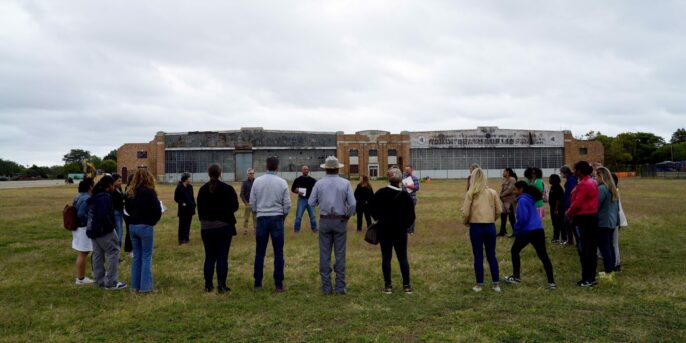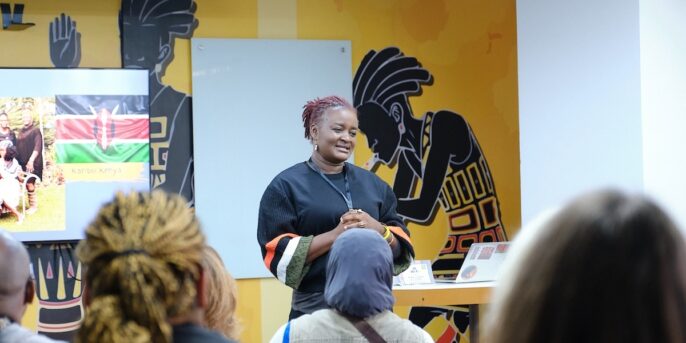In the past twelve months, Education Reimagined committed to developing and evaluating the research needed for learner-centered education and ecosystems to grow, spread, and become an integral part of communities. When we kicked off the year, Dr. Domonique Edwards and Dr. Khara Schonfeld shared the need and possibilities for distinct learner-centered research. We sat down again with our colleagues to chat about the exciting pieces of research they have explored this year, and what exciting work is up next.
Q: Can you share how the recently released 2024–2029 research agenda will inform your work and the larger field?
Khara: For the past year, Education Reimagined has focused on establishing a strong vision for our research work, which involved building a solid foundation to guide our research initiatives. This agenda stands on that foundation. It reflects our considerations, collaborations, and concentrated efforts to determine how research can support the organization’s vision and mission to serve as a catalyst for public education transformation.
The research agenda is a tool designed to guide the organization’s research endeavors, projects, and collaborations. It contains our framing of and approach to research and articulates six main focus areas and inquiries that will drive research our activities over the course of the next 5 years. Some of these activities include studying the learner-centered approach in practice and studying the components and functions of learner-centered ecosystems.
Domonique: The research agenda will also serve as a foundation for identifying and building strategic partnerships with other thought leaders in the field. We are aiming to work collaboratively with [researchers and/or organizations?] exploring aligned questions to not only triangulate our efforts but embrace a collective effort toward building the knowledge base necessary to advance this work.
Q: In what ways is the research team exploring how learner-centered education manifests in practice?
Khara: Our latest report, Learner-Centered in Focus, captures findings from our exploration of young people’s experiences in learner-centered environments, and it is guided by the research agenda’s focus area on how learner-centered education manifests in practice. Learners’ responses collected through Transcend’s Leaps Student Voice Survey helped us see the extent to which youth are experiencing—and sites are expressing—the five key elements of learner-centered education. Since many other young people across the nation have also taken this survey, we were able to examine how the experiences of youth in learner-centered environments compared to national benchmarks. Self-assessments and interviews with the site leaders, along with insights from scholarly literature, helped illuminate educational practices that are often implemented in learner-centered environments and the potential outcomes of the approach. We hope that this report can offer a compelling glimpse, through a research lens, into the innovative learner-centered practices that are shaping the future of education.
Right now, we are studying how learner-centered environments are working with young people with learning differences. As a former learner-centered educator and a parent of a young son who has been diagnosed with ADHD, I’m immensely interested and invested in this line of research. I’m eager to learn, on a personal and professional level, how learner-centered practitioners are working with children who are expressing learning differences such as attention deficits, dyslexia, and executive function challenges. I want to know: What can we discover from learner-centered environments about what works for youth with learning differences? What practices are key to the learner-centered approach? And how do youth with learning differences experience those practices?
What makes this research project even more exciting is that it’s being conducted as part of Education Reimagined’s new Immersive Inquiry program. This program is designed to engage professionals—educators, ecosystem builders, researchers, and others—as learning partners in a community of inquiry. Together, we will focus on answering questions, like those I hold as a parent, about learner-centered education. There is going to be a whole team of us working together to conduct this collaborative multi-case study! We will be visiting three learner-centered sites across the United States where 40–70% of their learners have been diagnosed with or are expressing learning differences.
Since learning within an ecosystem extends beyond conventional classrooms and includes community-based experiences, understanding how learning is documented becomes essential.
Domonique Edwards
Q: How will your research evaluate the ways in which learner-centered ecosystems emerge, how they are implemented, and how they sustain themselves across communities?
Domonique: We are excited to partner with 12 communities nationwide that are committed to advancing learner-centered ecosystems. They are participating in a year-long lab experience that involves action research to facilitate learning about the core functions of ecosystems that support their infrastructure, the contextual factors that influence how these functions are fulfilled, and the infrastructure challenges they face. This research will also assess what’s working and what isn’t in the solutions they are prototyping. We are designing a baseline survey to explore the current state of these environments and will administer follow-up surveys to examine how they emerge over time.
One key inquiry within this broader aim is a case study on documenting learning, which will provide valuable insights to guide decision-making across communities as they refine their ecosystem infrastructure. I’m collaborating with an emerging ecosystem to explore how educators document learning and how these practices align with the learner-centered values that emphasize student needs and holistic development. Since learning within an ecosystem extends beyond conventional classrooms and includes community-based experiences, understanding how learning is documented becomes essential. We are analyzing how insights from the case study can inform infrastructure evolution as ecosystems grow. By ensuring learning documentation reflects the core values of learner-centered education, we aim to provide practical evidence that can guide other communities in making informed decisions as they refine their own infrastructure. Ultimately, this process will help us understand how ecosystems emerge and sustain themselves by aligning practice with values.
Q: What are some projects on the horizon as you continue to holistically explore the world of learner-centered education and ecosystems?
Khara: Over the past 10 years, Education Reimagined has collaborated with many partners who have contributed to the conceptualization of “learner-centered education.” In terms of our research work, we describe it as an educational approach that focuses on the holistic development of young people within and as part of supportive communities and through unique learning journeys. As I mentioned earlier, the learner-centered approach is grounded in five key elements that, when present and equitably expressed, are designed to support young people for a life of learning as engaged members of society. These key elements include 1) learner agency, 2) socially-embedded, 3) personalized, relevant, and contextualized, 4) open-walled, and 5) competency-based. Inspired by the research agenda’s focus on furthering the conceptualization of learner-centered education, we are conducting an in-depth review of literature to illuminate these key elements in new ways. Equally important, this research activity will feed into the focus area in the research agenda that highlights the importance of studying the impact and holistic outcomes of a learner-centered approach.
Domonique: One upcoming project related to my work with ecosystems is a research brief that outlines the research and theory supporting the importance of investing in the infrastructure of community-based, learner-centered ecosystems. The brief will highlight existing research that clarifies how factors at the psychosocial, school, system, and sociopolitical levels shape learning environments. It will synthesize the implications for educational design, offering insights into how these factors influence learner outcomes. By understanding the pathways through which these factors impact education, we aim to inform strategies that better align educational ecosystems with holistic, learner-centered practices.
To learn more about our research work, you can check out the 2024–2029 research agenda and the newly released Learner-Centered in Focus report.





